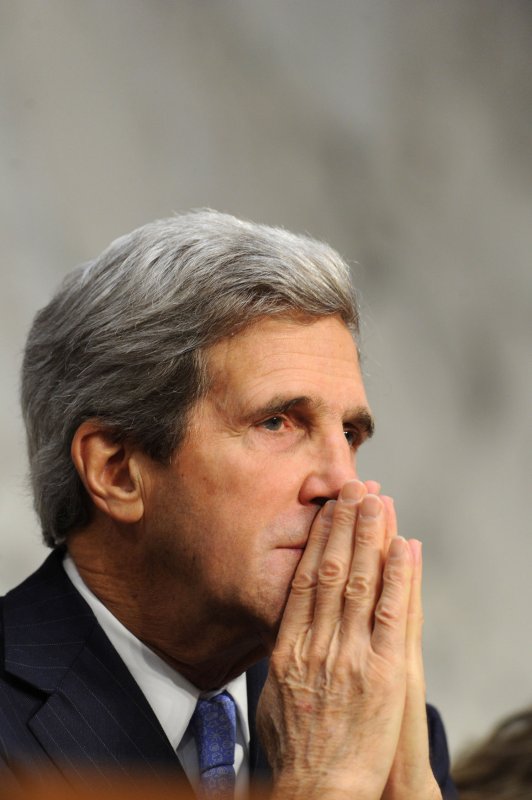John Kerry listens to testimony at a U.S. Senate hearing Dec. 20, 2012. UPI/Kevin Dietsch |
License Photo
WASHINGTON, Dec. 21 (UPI) -- U.S. President Barack Obama Friday nominated Sen. John Kerry, D-Mass., to succeed Hillary Clinton as secretary of state.
Announcing his decision at the White House, Obama said Kerry's "entire life has prepared him" to serve as secretary of state.
"As the son of a Foreign Service officer, he has a deep respect for the men and women of the State Department -- the role they play in advancing our interests and values, the risks that they undertake and the sacrifices that they make along with their families," the president said.
"Having served with valor in Vietnam, he understands that we have a responsibility to use American power wisely, especially our military power."
Obama said Kerry "knows, from personal experience, that when we send our troops into harm's way, we must give them the sound strategy, a clear mission, and the resources that they need to get the job done."
He said has "played a central role in every major foreign policy debate for nearly 30 years."
Kerry, chairman of the Senate Foreign Relations Committee, became the front-runner for the post after U.N. Ambassador Susan Rice said she did not want to be considered.
Clinton -- who has said she will leave the State Department as soon as a successor is in place -- is recuperating from a concussion and did not attend the announcement.
Obama called Clinton "outstanding" and said he looks forward to "paying tribute to her extraordinary service in the days to come."
"I had a chance to talk to her earlier today, and she is in good spirits and could not be more excited about the announcement that I'm making," the president said.
Rice, who had not been nominated, was under fire from Sen. John McCain, R-Ariz., and other Republicans for comments she made on Sunday morning talk shows after the Sept. 11 attack on the U.S. consulate in Benghazi, Libya.
Unlike Rice, Kerry is expected to face little opposition. He and McCain are longtime friends.
If the Senate ratifies his nomination, Kerry will take over a Cabinet department that has come in for criticism for what an independent review board called a "systemic failures and leadership and management deficiencies at senior levels within two bureaus" that led to the Benghazi attack, in which U.S. Ambassador to Libya Chris Stevens and three other State Department personnel were killed.
During congressional hearings on the Benghazi attack, members of the House and Senate have noted State Department security operations overseas have been underfunded.
Kerry has visited Afghanistan, where he helped persuade President Hamid Karzai to accept a runoff election, and Pakistan, where he helped negotiate the release of a CIA employee suspected of homicide and recover parts from a helicopter used in the Navy SEALs operation in which Osama bin Laden was killed in 2011, The Washington Post said.
After serving as a Navy officer in Vietnam, Kerry became an outspoken opponent of the Vietnam War. He served as lieutenant governor of Massachusetts for two years and was elected to the Senate in 1984.
Kerry was the Democratic presidential nominee in 2004, losing a close race to President George W. Bush.
Citing congressional aides, the Post said Sen. Robert Menendez, D-N.J., will assume the chairmanship of the Foreign Relations Committee and will oversee Kerry's confirmation hearing.















